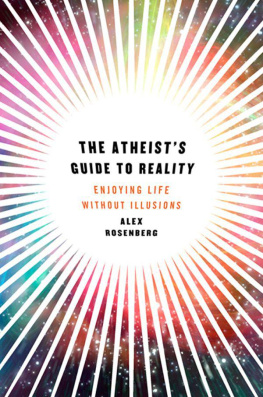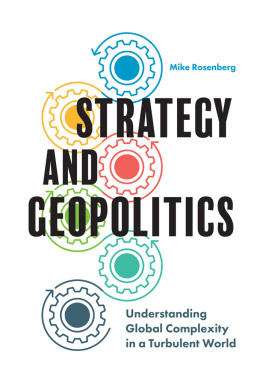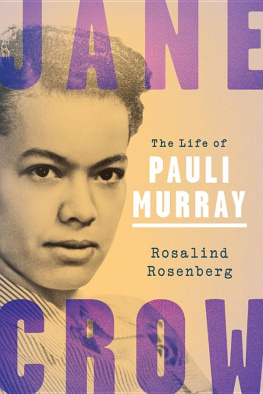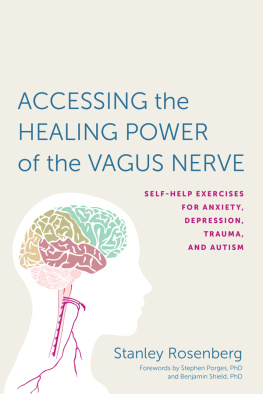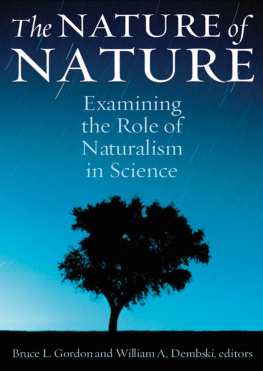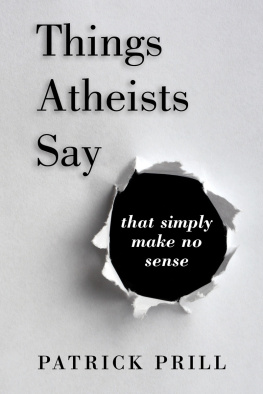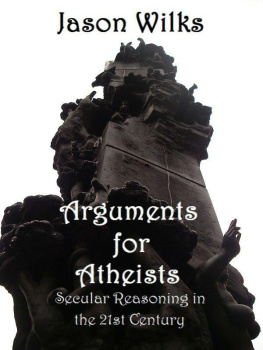
Also by Alex Rosenberg
Microeconomic Laws: A Philosophical Analysis
Sociobiology and the Preemption of Social Science
Hume and the Problem of Causation
(with T. L. Beauchamp)
The Structure of Biological Science
Philosophy of Social Science
Economics: Mathematical Politics or Science of Diminishing Returns?
Instrumental Biology, or the Disunity of Science
Darwinism in Philosophy, Social Science and Policy
Philosophy of Science: A Contemporary Approach
Darwinian Reductionism, or, How to
Stop Worrying and Love Molecular Biology
Philosophy of Biology: A Contemporary Introduction
(with Daniel McShea)
THE
ATHEISTS
GUIDE TO
REALITY

Enjoying Life
without Illusions
ALEX ROSENBERG

W. W. Norton & Company
New York London
CONTENTS
PREFACE
W HAT IS THE NATURE OF REALITY, THE PURPOSE of the universe, and the meaning of life? Is there any rhyme or reason to the course of human history? Why am I here? Do I have a soul, and if so, how long will it last? What happens when we die? Do we have free will? Why should I be moral? What is love, and why is it usually inconvenient?
These questions are unavoidable. But the answers arent. Indeed, most people manage to avoid them completelyand do it quite intentionally. People who believe in religion are particularly adept at avoiding the answers. This is not a book for them. This is a book for those who want to face up to the real answers to these questions. Its a book for people who are comfortable with the truth about reality. This is a book for atheists.
Most people think of atheism as one big negative. Atheists perpetuate the stereotype by devoting so much time and energy to broadcasting the evidence against Gods existence. But if atheism ever were a matter of evidence, it isnt any longer. Contemporary religious belief is immune to rational objection. Often we are wasting our time refuting it.
There is much more to atheism than its knockdown arguments that there is no God. There is the whole rest of the worldview that comes along with atheism. Its a demanding, rigorous, breathtaking grip on reality, one that has been vindicated beyond reasonable doubt. Its called science.
Science enables atheism to answer lifes universal and relentless questions with evidence employing a real understanding of the natural world. Some of the answers it provides to these questions may disconcert you. Several will certainly surprise you. But they are all as certain as the science on which our atheism is grounded. An unblinking scientific worldview requires atheism. Thats why 75 percent of the members of the National Academy of Sciences admit to being atheists. Four-fifths of the rest say theyre agnostics no opinion either way. It cant be a coincidence that 95 percent of the most distinguished scientists in America (along with their foreign associate members) dont believe in God.
If science made you an atheist, you are already as strongly committed to the serious scientific answers to the unavoidable questions as you are to atheism.
Science reveals a rough reality. But in its reliance on our capacity for experimentation, discovery, and cumulative knowledge, it solves all the great puzzles that people have tried to deal with through faith, philosophy, and alcohol and drugs. In doing so, science illuminates some of humanitys most remarkable qualities and unravels some of its deepest illusions. But atheists will find a surprising amount of consolation in this worldview, or at least a certain amount of relief from anxiety.
It was an American public radio humorist, Garrison Keillor, who first called the daunting problems that we all face the persistent questions. I have adopted his label to emphasize the fact that they keep bothering us until we find the answers. In fact, science has found the answerssome of them 400 years ago, others in the nineteenth century, and several only quite recently. These answers are provided by the very same facts that atheism itself rests on. Thats why they are a partthe positive partof the atheists worldview.
Scienceespecially physics and biologyreveals that reality is completely different from what most people think. Its not just different from what credulous religious believers think. Science reveals that reality is stranger than even many atheists recognize. From the nature of the reality uncovered by science, consequences follow. This book is about those consequences. It provides an uncompromising, hard-boiled, no-nonsense, unsentimental view of the nature of reality, the purpose of things, the meaning of life, the trajectory of human history, morality and mortality, the will, the mind, and the self.
REALITY IS ROUGH . But it could have been worse. We could have been faced with reality in all its roughness plus a God who made it that way. Take, for example, what the British historian Eric Hobsbawm called the short twentieth century. It starts in 1914 with the beginning of trench warfare in the First World War and carries on through the worldwide influenza epidemic of 1918, the Russian civil war, collectivization, and great purge, the Great Depression of the 1930s, through the Second World Wars Holocaust and the nuclear attacks on Japan, and all the way past the Chinese Great Leap Forward famine of 1958 to the collapse of the Berlin Wall in 1991a 73-year century with enough hor rors to last Earth a millennium. Now add to those horrors the God of the Abrahamic religionsJudaism, Christianity, and Islamand you get an even worse reality; its one just as rough as the real world, but it adds a moral monster who arranged for it all to happen.
In recent years, there have been a number of very popular books devoted to disapproving of as well as disproving religious belief. Some of them attack arguments for Gods existence, and others show the harmintellectual and moralthat religions do in the name of their respective deities. A Nobel Prizewinning physicist, Steven Weinberg, once said, With or without religion, good people can behave well and bad people can do evil; but for good people to do evil, that takes religion. He had a point.
But its not my point. I am not interested in hammering another nail into the intellectual coffin of theism. Enough of those arguments already exist. And the relative lack of originality in the arguments of the recent best sellers attacking religion ( The God Delusion , God Is Not Great , Letter to a Christian Nation ) shows that the arguments have been around for quite some time and have achieved little effect. The effort to argue most people out of religious belief was doomed by the very Darwinian evolutionary forces that the most fervent of Christians deny. The most sophisticated believers understand the arguments against theism. Yet they are still able to create clever excuses for harboring theistic convictions as logically self-consistent if ultimately unprovable. If they can do it, imagine how much easier it is for credulous people, who are neither as well informed nor as logically scrupulous, to continue to believe. There is little point in preaching to these unconverted.
This book doesnt preach to the converted either. Instead, its aim is to sketch out what we atheists really should believe about reality and our place in it. The picture painted here is subject to completion and modification. What is not debatable are the broad outlines of the sketch. They are the reasons we can be so confident about the nature of reality. All we need to understand its character are the parts of modern science that are no longer in doubt. These parts are so basic that nothing to be uncovered by physics or biology will make science take them back.
Next page
